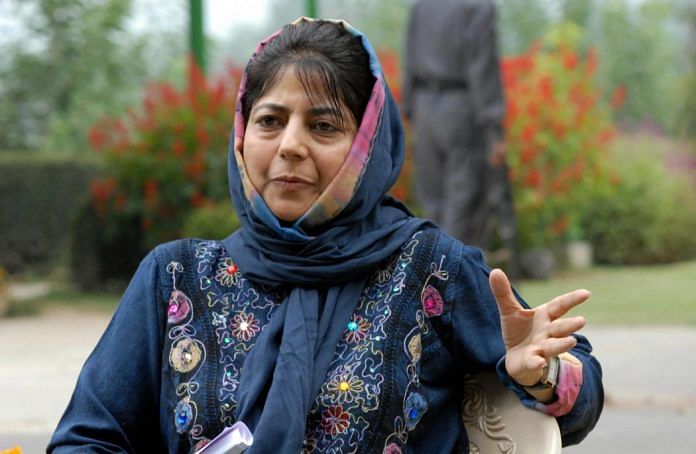The Congress has still not forgotten the humiliation it suffered in 2008.
Mehbooba Mufti is a strong woman who, many would know, took the lead over her father, the late Mufti Mohammad Sayeed, in building the Peoples Democratic Party (PDP) from the scratch.
If Sayeed was the strategist, the brain of the party, Mehbooba was the able lieutenant, the volatile but extremely street-smart rabble-rouser. She understood well that reaching out to families of those bearing the brunt of the “struggle” in militancy-hit Kashmir would translate into votes.
When her father walked out of the Congress in 1998-99 along with some of his colleagues to form a regional party, Mehbooba, then an MLA, followed suit.
She became the public and aggressive face of the fledgling party, in sharp contrast to her more nuanced and suave father who was more at ease cutting political deals and stitching alliances than her.
This fact – that she is aggressive and better at protests and rallying – became her nemesis when she took over as the chief minister of Jammu and Kashmir after the death of her father.
To begin with, she didn’t have the political cunning of her late father to face the challenges a tie-up with the BJP brought. Under Mehbooba, the PDP’s alliance with the BJP was a disaster-in-waiting for both, but especially for the party from the Valley.
Now, with reports suggesting that the PDP is trying to entice the Congress into a fresh alliance, here are four main reasons why it will not happen, at least in the immediate future:
Congress will not want to lose NC
Any tie-up with the PDP would mean an end to what promises to be a mutually beneficial and profitable alliance between the Congress and the National Conference (NC). During her two-year stint as the chief minister, Mehbooba was unable to do much for her core constituency of pro-separatist Kashmiris due to the constraints of her alliance with the BJP.
In the meantime, the NC has seen a remarkable upswing in its support. Omar Abdullah, once seen by many as a reluctant politician unlike Mehbooba, has emerged as a leader in his own right. He has played his cards well, although he still has a long way to go. Omar has successfully ensured that the NC capitalised on Mehbooba’s failure to deliver on the development front or prevent killings in the Valley. With the NC as its partner, the Congress can also hope to gain more in terms of seats.
Why bear the burden of PDP’s anti-incumbency?
For the Congress, any tie-up with the PDP would also mean that the party would have to share the anti-incumbency that is prevailing across the state against Mehbooba. The mood in the Valley is against the PDP and any tie-up with it could mean that the Congress will lose out on the chance to improve its standing in the region whenever fresh elections are held. Ditto for the Jammu region where Mehbooba is not the flavour of the season by a long shot.
Such an alliance will help the BJP
After the rape-murder of the eight-year-old girl in Kathua, the sentiment in Hindu-majority Jammu has turned against Mehbooba, courtesy the public speeches by the BJP leaders, particularly former minister Lal Singh.
A tie-up with her party could result in Jammuites sticking with the BJP. Despite its grandstanding and public statements after the break-up, the BJP has not been forgiven by the people of Jammu, many of whom continue to accuse the party of having bartered Jammu’s interests for power. More importantly – this could be a winner for the Congress – many BJP ministers were seen as incompetent and corrupt.
If it ties up with the PDP, the Congress could end up alienating the Hindu voters of Jammu, who overwhelmingly voted for the BJP in the 2014 assembly election.
Voters in Jammu, many feel, are ready to return to the Congress fold, but any tie-up with the PDP will only scare them away.
Congress hasn’t forgotten 2008
In 2002, Sayeed joined hands with the Congress to form the government in the state. As part of the deal, Sayeed was to be the chief minister for the first three years while Congress leader Ghulam Nabi Azad would occupy the chair for the remaining tenure – the Jammu and Kashmir Assembly, unlike other states, has a six-year term.
While Mufti completed his tenure, he pulled the plug before Azad could complete his tenure in 2008. This happened after the state witnessed polarisation over the issue of transfer of land to the Amarnath yatra shrine board. The Congress has still not forgotten that humiliation and is also aware of the fact that it was Mehbooba who had pushed her father into withdrawing support.




Many BJP ministers were seen as incompetent and corrupt … This is something the BJP needs to think about deeply. As an overbearing formation that covets all political space, it has promised to be a party with a difference. If, on integrity, its folk are no better than the Congress which it constantly mocks, and in terms of governance skills, courtesy its being a late entrant to power, much less able, what it wins at the hustings will be lost in the secretariat. Anti incumbency is bound to build up in light of poor delivery. It also needs a better set of chief ministers.